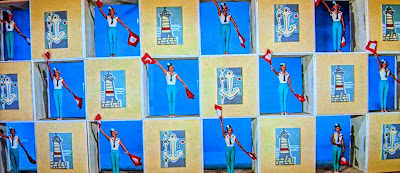I've recently been using the film streaming site Kanopy to explore the obscure world of East German musicals thanks to a collection of restored vintage titles from the Communist-era German Democratic Republic made by DEFA, the state film bureau. All three are resolutely apolitical and are designed as middle-of-the-road crowd-pleasing entertainment.
Revue um Mitternacht (Midnight Revue, 1962) is a light farce in which songwriters and filmmakers are kidnapped and locked up in a mysterious mansion so as to produce a hit musical on a tight timeframe, for almost no discernable reason. Some have described Heisser Sommer (Hot Summer, 1968) as East Germany's pre-saging of Grease due to its rivalry between good-looking troupes of young women and men, but it's more accurate to liken it to the wholesome family-friendly 'good clean fun' of Cliff Richard's The Young Ones (1961) or Summer Holiday (1963). And Nicht Schummeln, Liebling (No Cheating, Darling!, 1973) carries on the battle of the sexes motif to a small town in which a clever female doctor takes on the town mayor at his own game when she forms a ladies' football team to teach him a lesson for commandeering all the town's resources to support the men's football team.
Of the three Revue is most akin to a frothy Jacques Demy musical, and the lavishness of the sets and production numbers shows the East German authorities' desire to provide an impressive film spectacle for East German viewers. There's also a touch of Busby Berkeley's ambition in some of the set pieces, such as the stage set designed to show off a dozen smartly-dressed semaphore girls, deploying their skills in such a coordinated fashion that long-serving Chairman of the East German State Council, Walter Ulbricht, would no doubt have been proud.
Heisser Sommer is an exuberant tale of perky eighteen-year-olds who hitch-hike to the Baltic coast for their summer holidays at the sea-side resort island of Rügen. A rivalry springs up between the troupes of girls and boys, initially because the girls gazump all the hitch-hiking opportunities, and exacerbated when the boys trick the girls into traipsing across a mosquito-infested swamp to get to their destination. (The mosquitos are at least partially repelled when the girls all light up and smoke cigarettes like veritable chimneys). Many of the songs, as in Grease nine years later, revolve around one-upmanship, with the boys proclaiming their prowess at boisterous 'boy things' and the girls either tearing down their arguments or simply dissing their masculinity and maturity at every opportunity.
Nicht Schummeln, Liebling, the slightest of the three films, follows a similar path, with the founding of the girls' football team to take the prideful boys' team down a peg, but adds a layer of local politics in which the town council is manipulated to honour accidental promises to give the girls the same perks as the boys - chiefly a club-house for the purposes of staging slap-up meals, plus the obligatory song and dance numbers. The girls also present the boys' captain with a live piglet, for some reason.
 |
| Frank Schöbel (c) & Chris Doerk (r) |
 |
| An idiosyncratic if memorable lyrical turn of phrase |
Heisser Sommer and Nicht Schummeln, Liebling are also noteworthy for featuring the real-life husband and wife team of performers Frank Schöbel and Chris Doerk, who were both highly-popular East German pop performers in their heyday. Both deliver almost ridiculous levels of enthusiasm, immaculate hairdos and toothy vigour, even when required to dance joyfully on cobblestones in fake rain or be pushed down a steep street in a go-kart by slightly crazed schoolgirls.


